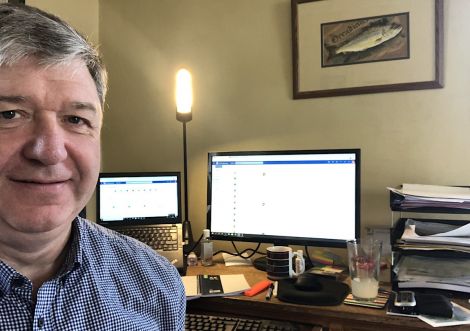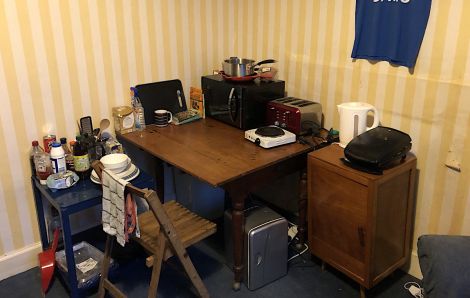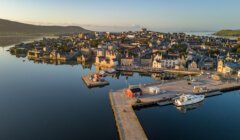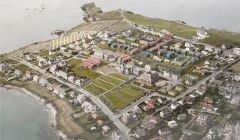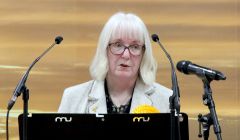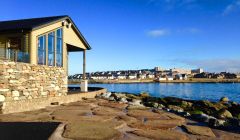Coronavirus / Having half a house each
As part of our Covid-19 coverage we are asking our readers to contribute short personal, reflective pieces that touch on the many aspects of living through these unprecedented times. Alistair Carmichael says he has never been busier as an MP.
AS I WRITE, I am in the last 24 hours of my two-week self-isolation. I have to say that the time has flown by, helped in large part by the fact that in almost nineteen years in parliament I have never been busier.
Day after day the “to do” list has been longer at the end of the day than it was at the beginning, even though my diary has been filleted of all the things that normally keep me away from my desk.
For me, the self-isolation has been a precaution. Having left the hotspot of London two weeks ago to Orkney which (then) had no confirmed cases, I was acutely aware of my responsibility in not being a spreader of the virus. I am also married to a key worker (my wife is a vet) who suffers from asthma, so the pressure not to bring the virus home was especially felt.
We are fortunate. We live in a house that is big enough to split in two and which can be split by shutting a couple of doors. I have the upstairs and use the front door while Kate uses the downstairs and the back door. We joke that it is like having had a divorce without the acrimony and the lawyers’ fees. We have half the house each, I have custody of the dog and she has the cat (I will leave you to decide who is winning!)
Unfortunately, she also has the kitchen. I have my own makeshift kitchen in what was the spare bedroom with a kettle, a toaster, a microwave oven and a George Foreman grill.
Like many others, my ‘office’ is a desk in one corner of the living room with a laptop and a small printer/scanner/copier. From there I stay in touch with my team and my colleagues who continue to work from home. The remaining meetings in the diary are done by video conference; Zoom, Skype and Microsoft Teams have become essential parts of work life.
Become a member of Shetland News
I have never been a great fan of video conferencing. Joining meetings from a distance always felt like being a secondary observer. You are the person on the screen, unable to read the reaction of people around the table, missing out on all the side conversations where the real decisions are often made.
When everyone in the meeting is on their own the dynamic is different. You participate on an equal footing and no one is at a disadvantage. It also, incidentally, allows you to see a small snapshot of colleagues’ homes. The artwork on walls and books on shelves in the background can give you an insight you would never normally have!
For some time to come this is how it is going to be. At present the House of Commons is in recess for Easter. MPs are spread around the United Kingdom and we are due to return in twelve days.
I hesitate to predict much at the moment, but I am certain that parliament cannot return without changes in how we operate. Social distancing is just not consistent with the way we work. A chamber that crams 650 MPs into a space designed for 430 makes social distancing impossible. So does a voting system that has us squished through a lobby to be counted out a door at the other end.
Nevertheless, the work of parliament in holding government to account is more important than ever. The steps necessary to tackle this virus have laid waste to vast tracts of our economy, as businesses have had to shutter. Cashflow has dried up overnight. There is an understanding here – we cooperate with this shutdown on the understanding that people will be taken care of.
The spending taps have been turned on in the Treasury at a pace that was unthinkable just a month ago but many of the pipes through which that money should flow are already leaking or are just too small.
The intentions of the various government schemes are good but the execution has inevitably been vulnerable to the law of unintended consequences. Just about every measure that has been announced needs to change or else they will not meet the objectives set for them.
Government ministers must account for their decisions. If that cannot be done in the normal way then parliament must be prepared to do things differently – as we demand of everyone else. This must be the moment when parliament comes kicking and screaming into the 21st century.
This morning I convened a meeting with the chief whips of the Conservatives, Labour, the Scottish and Welsh Nationalists and the Greens. More discussion is needed but we all agree that changes will be required. That work is under way.
Every day I hear people speak about how things may be when we get back to ‘normal’. I understand the sentiment but increasingly I find myself questioning it.
Lockdown has forced change on us. It has shown us what is possible using modern technology. As we emerge from lockdown, we have to think about which changes we may wish to make permanent.
We have known for years that to tackle issues such as climate change would require great behaviour shifts, but we have been resistant to even incremental change.
Radical change has been forced on us now. This time will pass, but life on the other side could be better, more equal and more sustainable – if we embrace some of these changes to our lives as we move forward.
Please feel free to get in touch and share your thoughts and experiences of what challenges life throws at you right now.
How do you cope with self-isolation, being unable to go to work or see friends, with home education, with loneliness? And what do you do to counter it? Start an Open University course, go through all those family photos or spend more time with friends online?
We look forward to hearing from you at news@shetnews.co.uk
Become a member of Shetland News
Shetland News is asking its readers to consider paying for membership to get additional perks:
- Removal of third-party ads;
- Bookmark posts to read later;
- Exclusive curated weekly newsletter;
- Hide membership messages;
- Comments open for discussion.
If you appreciate what we do and feel strongly about impartial local journalism, then please become a member of Shetland News by either making a single payment, or setting up a monthly, quarterly or yearly subscription.






